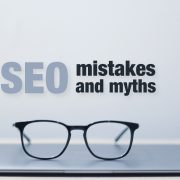Not all SEO efforts end well. There are a lot of myths and mistakes that beginners can make which end up doing nothing or even harming your rankings.
For those who are new to optimizing their pages the whole thing can seem a bit unclear at times.
If you want to keep your ranking then pay close attention to the following myths and mistakes. Knowing how to rank higher in search engines isn’t just about what you know but also being able to parse the bad from the good.
We’ve compiled twelve of the most common, read on and we’ll show you how to avoid wasted effort and dropping rankings.
Myth #1: Keyword Targeting is No Longer Needed
If anyone tells you that keywords don’t matter anymore… well, they’re wrong.
Go punch something into Google and see how many results come back with an exact keyword match. For shorter phrases the answer to that is likely to be around 100%.
Contextual searching has changed the game for long tail keywords. Semantically related phrases will pop up easily now.
If you try asking a question or typing in a long phrase in Google the exact match percentage is going to go down. That doesn’t mean that keywords are a thing of the past.
While it’s true that keyword stuffing and other outdated tactics will actively get you penalized these days, you should still keep your keywords in your on-page SEO.
Search engines are always going to use keywords. It’s the nature of the beast and you don’t want to fall behind by buying into this myth.
Myth #2: SEO is Dead
People have been saying that SEO is dead for a long time now.
Most of these people are trying to sell you on alternate models like sales funnels powered by PPC advertising. The rest are frustrated that they’ve had to change their tactics as time goes on.
The truth is that SEO techniques naturally evolve but as long as there are search engines there are going to be ways to make sure that your content ends up on top.
Black hat techniques are falling off more quickly.
Good SEO these days comes from providing an optimal user experience.
Myth #3: Only Top Ranking Matters for X Keyword
Many of us want to make sure that we rank for generic keywords.
The competition is stiff and many people pour a ton of money and time into trying to get there.
And a lot of them will fall short.
The truth is that focusing on long tail keywords can help to bring in an impressive amount of organic traffic while keeping you from banging your head against the wall.
If you can rank #1 for ten long tail keywords which have the same overall traffic volume as the more generic phrase you’re competing for you’ll be in good hands.
Your ranking matters but it’s the overall amount of traffic you can get coming in that will be the big one in the end.
Myth #4: Google Hates SEO
They don’t.
Or, to be more accurate: Google actively opposes black hat SEO techniques while purposefully rewarding sites which generate a great user experience.
Many of the major updates on Google have been targeted at reducing the instances of pages ranking while not giving the users what they need.
They’ve made their official stance pretty clear.
They also have a beginner’s guide available for those who still insist Google’s stance on SEO is a completely negative one.
There are a lot of shady techniques out there and as Google evolves, so do black hat techniques. They aren’t going anywhere soon but if you opt to use them you’re going to get caught sooner or later.
Myth #5: SEO is Digital Sleight of Hand
There’s a growing, vocal group out there that contends that search engine techniques are nothing but a scam.
Google contends the opposite. Thousands of people who’s businesses have been helped through organic search traffic brought about by SEO would probably argue otherwise as well.
SEO got a bad rap: in the early days it was mostly cheap, borderline-spam techniques which ended up dominating Google’s rankings before the release of the Penguin update.
Instead the focus is now on producing great content for your readers and potential customers.
It’s still SEO. It’s just the newest iteration.
There are still agencies out there which can hurt your rankings. You’ll just want to make sure you properly vet anyone you choose to work with.
Myth #6: Paid Ads Are the Only Way Forward
Once again this myth seems to be mostly propagated by people who are trying to sell you something.
The truth is that 10% of clicks go to paid ads on Google, the other 90% are focused on the organic search results. While this ratio has been changing as people get better with correctly targeting PPC traffic its still not topped out.
We recommend using both. PPC traffic, with the right targeting, can convert at a higher rate than organic traffic.
More and more people are developing some internet savvy. That’s actually a good thing for those operating under a PPC model, if someone clicks on a paid ad then chances are they have commercial intent.
But the largest portion of clicks still comes from organic traffic.
You shouldn’t ignore either but don’t let people scare you into thinking that only paid ads are worth investing in nowadays.
Mistake #1: Not Developing Plans
SEO doesn’t just happen. If you’re trying for a better search engine ranking then you need to button down and focus.
That means strategy is essential.
Just jumping in is better than doing nothing but if you want to dominate the search engines you’re going to need a plan.
Mistake #2: Neglecting Smaller On-Page Search Engine Techniques
Title tags and meta descriptions are two of the simplest pages of on-page SEO to handle. Anyone who knows what keyword they’re targeting can make sure they hit them.
Which makes it odd that so many people neglect them.
If you have great content then you want to show it off then you should be doing everything within your power to climb through the rankings.
Title tags are always a good idea to spend some extra time on. You don’t need to be an excellent copywriter to figure out which information and keywords need to be there.
Meta descriptions get a little bit more complicated.
Think of them as short form copy for drawing in traffic. A good meta tag can increase the click-through rate of a post or page quite a bit and a generic sounding one can hurt it.
In either case, make sure that you have these two elements in order for the best results with both SEO and CTR.
Mistake #3:Focusing on Quantity of Links
Off-page SEO is dominated by backlinks.
There’s a reason that sites which sell an impressive amount of backlinks are still around despite it being directly against Google’s policies.
What many newbies don’t understand is that the quantity of backlinks pales in comparison to the quality.
If you get featured on Forbes then that one back link is going to have more “juice” than a dozen paid-for links on no-name blogs.
Your outreach efforts should always focus on authority sites if you’re having to put work into them.
While you shouldn’t neglect getting backlinks anywhere you can, you’ll improve your rankings much more if you make sure you have links to high authority web pages.
Mistake #4: Low Quality Content
When you’re in a hurry to get a project going and you don’t have a ton of funds mistakes happen.
One of the biggest traps that people fall into is hiring bad content writers to do the work for them. It’s easy to find someone who works cheap after all.
Good content will cost you some cash but a single great piece is worth it’s weight in gold.
Not everything on your page needs to be incredible cornerstone content but every single thing should be readable and of use to the user.
Major grammatical mistakes, blocks of text, and misuse of words plague sites which aren’t careful when outsourcing their work. They can hurt your rankings and increase the bounce rate from your site.
Don’t mess around with your content, six good pieces is worth two dozen lesser ones.
Mistake #5: Giving Up Too Early
Good SEO takes awhile to go into effect.
You can help things along by ensuring that you have a proper XML sitemap in place, especially if you’re a newer site.
On the other hand don’t be discouraged if you’re not dominating the first page for your targeted keywords at the end of the week, or even the month.
This is especially true if you’re using white hat techniques.
Rome wasn’t built in a day and you shouldn’t expect your business to be either.
Things can be even harder if you’re using someone in-house due to the complexity. Most companies will want to take a look into the benefits of outsourcing their SEO.
Mistake #6: Neglecting Anchor Text
The anchor text for both your internal and external links matters.
Avoid excessive inbound linking, especially if you’re going to be repeating the same keyword rich anchor text.
You’ll also want to avoid things like “click here” for the most part. These generic anchor texts can work once in awhile but Google reads for context as well as the link itself.
It’s a simple fix, just work things in naturally and you’re on the right path.
Putting in the Work
When it comes down to it, your SEO strategy is going to take a lot of work and time no matter how you’re planning on doing things.
Steer clear of myths and make sure you use only good search engine techniques and you’re well on your way.
Knowing how to improve search engine ranking is only half the battle, you still need to put in the time to do it.
If you’d rather focus on what you love, however, it may be time to contact a professional and see what they can do for you.





